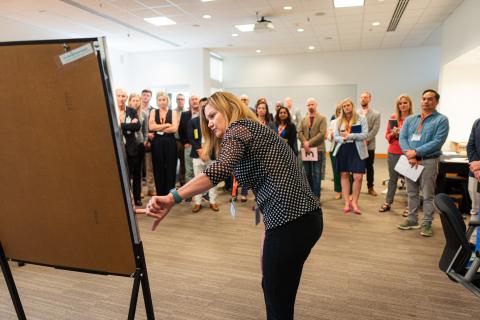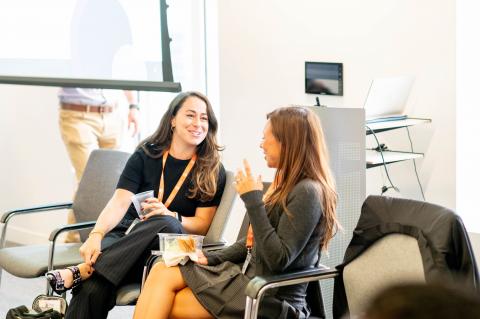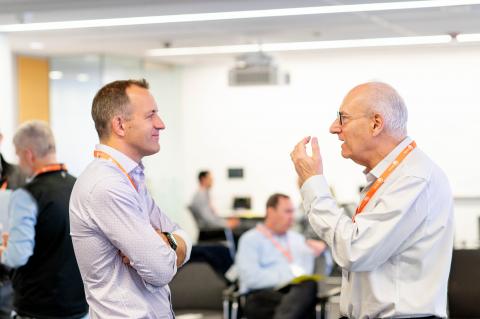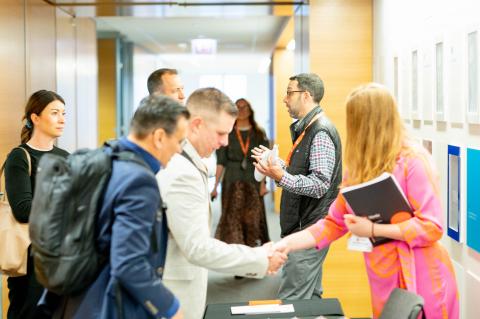On 1 December 2021, Theresa Cook, EMEA Talent Development head for TikTok and ByteDance, and her team attended a Town Hall where they were told that the talent development global function was being made redundant.
"Now, in any organisation that is quite a shock," Theresa recalls, "however, in a startup organisation, which I did sign up for, I also knew that these are the kind of things that might potentially happen."
How can you support your Talent Development team at a time of sudden change?
Theresa leaped into action. "Coming from South Africa," she says "we're very solutions orientated."
More than that, she says, her own personal philosophy and agile mindset helped her. "When something happens in life which is different or unexpected you just shout out 'plot twist!' and write your own story about how the next part of it is going to end, because nobody's going to come and save you."
"You are the hero of the story, you are the author of that story, and you need to write what that next part looks like."
She started by focusing on her team. "I had built up some wonderful connections and relationships with people in the business and had done a lot of collaborating with other teams in the business."
Theresa was able to get new positions internally for all but one member of her team, and next she looked to her own future.
As a leader, how do you deal with change?
"Then," she says, "I had one of the other teams saying, Theresa, we've worked with you and we really want to keep you on."
The result? Theresa doesn't just have an EMEA role anymore. She has a global role.
Change, Theresa reflects, can "come out of left field". But the important thing is that you ask "what is the opportunity?"
You can prepare your leaders and your teams to deal with situations like this, Theresa says, by having the right culture "in terms of, how we do things, how we look at things, and how we approach things."
Why is context over control important to your company culture?
"One of the things which is super interesting is context over control," she says, "and that really helps with that agility mindset, is what is the context that this is happening in?"
That's the culture Theresa and her colleagues try to drive home at TikTok.
In the situation her team found themselves in on 1 December, "the context was we knew moving into a different way of doing things, we're moving from global centres of excellence and rather moving it into functional centres of excellence."
With that context, the decision TikTok as a company was taking made a lot more sense, and the opportunities it presented became a lot more obvious.
Why does TikTok adopt an "always day one" business culture?
Second, TikTok's "always day one culture" gives your leaders and your teams the confidence to try things, fail, and move on.
"If I’m going to do something and if our teams are going to do something and it's something we've never done before, run a quick short pilot. Figure out what works and what doesn't work. Iterate, iterate, iterate."
Don't spend 12 months trying to make it perfect, she says.
"Yes, this project was my idea, but so what? You've got 10 other ideas so if this doesn't work, we can try something else."
Using Design Thinking, the team at TikTok put together working prototypes in a short space of time, maybe one or two hours. "What are those prototypes? Go out there go and test them."
"When they walk out of it," Theresa explains, "they've already got something that they can go and test and come back and tell us whether it works or not."
Understanding the speed of change makes a big difference too.
"We don't always have time to now take many many months to try and figure things out, getting those groups together."
It's all about collaboration.
"I don't think we've got it 100% right because we're always learning, we're always growing, we're always wanting to do it better, but spending time on how do we collaborate particularly in a global organisation."
Join the Conversation
If you're a CLO, you can join Theresa and other HR leaders for free at the Learning Futures London Executive Knowledge Exchange. Or to find out more about how to join the conversation at a Knowledge Exchange in locations around the world and online, visit our events page.
Theresa Cook is Global Talent Development Program Manager at TikTok, with over ten years experience of delivering training and development solutions in global organisations.
Prior to her role with TikTok, Theresa held positions at PwC, Amazon, ADT Fire & Security, New Vision Training Consultants, and The Training Team. Working closely with HR, Theresa has assisted in managing performance systems, talent management and workplace skills plans that are aligned to the employment equity plan. Theresa has designed, facilitated and assessed Leadership Development programs, as well as established Leadership, Sales and Technical Academies. Her specialties include facilitation, leadership training and coaching, change leadership, performance and talent management systems, and succession and critical role strategies.









